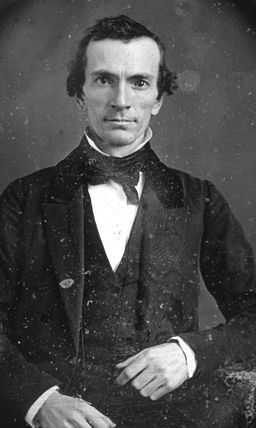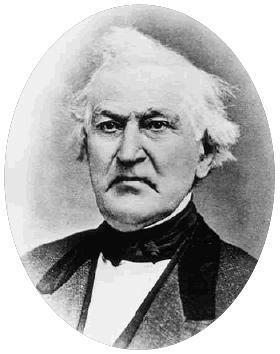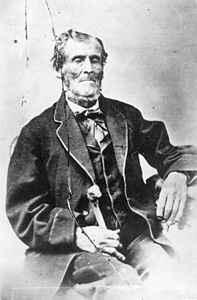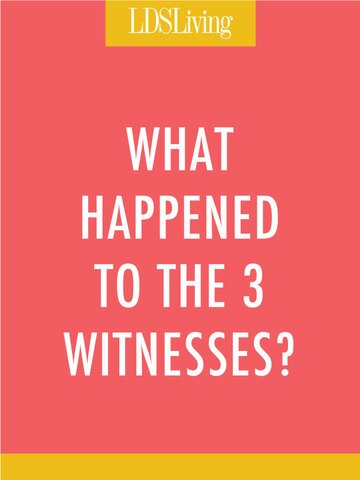The following article was originally published on LDS Living in July 2015.
The names of Oliver Cowdery, David Whitmer, and Martin Harris are familiar to most of us, notably because of their role as witnesses to the reality of the Book of Mormon. (Note: The Three Witnesses, unlike the Eight Witnesses, were shown the plates by a heavenly messenger, not Joseph Smith.) But though their testimonies are still printed at the beginning of every copy of the Book of Mormon, all three of these men left the Church at some point—only two returned. Find out what happened to the Three Witnesses after they signed their names to their testimonies.
Oliver Cowdery

Before
Oliver Cowdery first came in contact with the gospel in 1829 while boarding with the Smith family as a school teacher. He quickly embraced the story of The First Vision and found himself eager to be a scribe for Joseph during the translation of the Book of Mormon.
A revelation given in 1829 (D&C 17) instructed Oliver Cowdery, David Whitmer, and Martin Harris that if they were humble and had faith, they would be permitted to be the three special witnesses the Book of Mormon described.
After
Cowdery continued to serve alongside Joseph Smith in the years to come. But in 1838, after a disagreement with early Church leaders, Cowdery was excommunicated. Though he disputed the charges of dishonesty and lying about Joseph Smith, he left the Church for the next several years. He eventually made his way back to Ohio, going into law with his brother, Lyman. Unlike many others who left the Church during times of trial, Cowdery never became antagonistic towards the gospel or lost his testimony.
In fact, after seven years of practicing law, Cowdery traveled to Winter Quarters, Nebraska, to seek readmission to the Church and was rebaptized there. He had plans to go west with the Saints but died of tuberculosis before he was able to. He was 43 years old.
David Whitmer, another of the three witnesses, recalled Cowdery’s parting words: “I was present at the death-bed of Oliver Cowdery, and his last words were, ‘Brother David, be true to your testimony to the Book of Mormon.’”
David Whitmer

Before
David Whitmer was first introduced to the Church by his friend Oliver Cowdery. In 1829, after Cowdery had been acting as a scribe for the translation of the Book of Mormon for a few months, he sent a letter to David Whitmer testifying of the prophet Joseph Smith and the Book of Mormon. He also asked Whitmer if they could come to his home to finish translating, due to increasing mob violence in Pennsylvania. A series of miracles convinced Whitmer that this was the path the Lord wanted him to take and brought both the Prophet and Cowdery back to Fayette.
During their time at the Whitmer home, Oliver Cowdery, David Whitmer, and Martin Harris were shown the plates and recorded their testimonies.
After
Though David Whitmer would be involved in various Church activities over the next several years, a series of small problems and doubts about Joseph Smith’s credibility as a prophet caused the entire Whitmer family to leave the Church. David Whitmer refused to address any charges brought against him, instead preferring to withdraw from the Church. He was excommunicated in 1838 for apostasy.
He ran a successful livery stable business until his death in 1888, never returning to the Church. During those years, he “reorganized” the Church for a time, later confessing they did so without proper authority. Towards the end of his life, he ordained his nephew to “perpetuate the Church of Christ,” which meant sticking only to the doctrines revealed in the beginning of the Church. However, he never did deny his testimony of the Book of Mormon. Shortly before he died, he made a public statement to the local Richmond Conservator newspaper:
“That I have never at any time denied that testimony or any part thereof, which has so long since been published with that Book, as one of the three witnesses. Those who know me best, well know that I have always adhered to that testimony. And that no man may be misled or doubt my present views in regard to the same, I do again affirm the truth of all my statements, as then made and published.”
Martin Harris

Before
A historic Church figure most recognized for his part in the loss of 116 manuscript pages of the Book of Mormon, Martin Harris actually played an important role in the Church and was faithful enough to be one of the three witnesses to the Book of Mormon.
A war veteran and respected leader in the community, he befriended Joseph Smith and became a scribe for the Book of Mormon translation starting in 1828. After the 116 pages went missing, he stopped his work as a scribe. Nine months later, however, Harris was promised that if he would humble himself, he would be one of the three witnesses to the plates, which he was in 1829.
After
That same year, Harris mortgaged his home and farm to help pay for the printing of the first 5,000 copies of the Book of Mormon. He later lost a portion of the farm when the note came due.
Harris was actively involved in the Church until 1837, when financial and spiritual conflicts caused him to “lose confidence in Joseph Smith” and he was excommunicated. His first wife, Lucy, died in 1836, and within a year he remarried to a niece of Brigham Young. Harris and his family did not move west, but he was eventually rebaptized in Kirtland in 1842. Though his wife and children moved to Utah a little over 10 years later, Harris stayed in Kirtland, watching over the temple there until an invitation from Brigham Young finally reunited him with his family in Utah.
He lived to be 92 and passed away in Clarkston, Utah in 1875. Before he died, he again affirmed “I tell you of these things that you may tell others that what I have said is true, and I dare not deny it; I heard the voice of God commanding me to testify to the same.”






